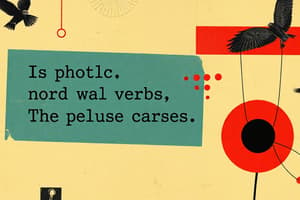Podcast
Questions and Answers
Which of the following sentences uses a modal verb correctly?
Which of the following sentences uses a modal verb correctly?
- He can’t went to the concert last night.
- I mustn’t forget to buy groceries tomorrow. (correct)
- You could go to the store if you feel hungry. (correct)
- They shoulds finish their project by next week.
A non-defining clause contains essential information to understand a sentence.
A non-defining clause contains essential information to understand a sentence.
False (B)
What is the structure of a 1st conditional sentence?
What is the structure of a 1st conditional sentence?
IF + present simple, will + present simple
If I had studied harder, I _____ passed the exam.
If I had studied harder, I _____ passed the exam.
Match the following modals with their appropriate usage:
Match the following modals with their appropriate usage:
In which of the following sentences is 'used to' used correctly?
In which of the following sentences is 'used to' used correctly?
You mustn’t do something that is permitted.
You mustn’t do something that is permitted.
Give an example of a sentence using the 2nd conditional form.
Give an example of a sentence using the 2nd conditional form.
You _____ better be on time for the meeting.
You _____ better be on time for the meeting.
What form is used in the 3rd conditional?
What form is used in the 3rd conditional?
Flashcards
Modal verb: SHOULD
Modal verb: SHOULD
Used to express advice or obligation.
Modal verb: MUST
Modal verb: MUST
Used to express strong deduction or obligation.
Modal verb: COULD
Modal verb: COULD
Used to express possibility in the past.
Modal verb: CAN'T
Modal verb: CAN'T
Signup and view all the flashcards
1st Conditional
1st Conditional
Signup and view all the flashcards
2nd Conditional
2nd Conditional
Signup and view all the flashcards
3rd Conditional
3rd Conditional
Signup and view all the flashcards
Defining Relative Clause
Defining Relative Clause
Signup and view all the flashcards
Non-Defining Relative Clause
Non-Defining Relative Clause
Signup and view all the flashcards
Used to
Used to
Signup and view all the flashcards
Study Notes
Modal Verbs
- Should/Shouldn't: Expresses advice or obligation. Example: You should go to the doctor if you're sick. Shouldn't eat something if it seems strange.
- Must/Mustn't: Expresses strong deduction or prohibition. Example: I must have been very drunk last night. Must not play video games all day if you want to pass the test
- Could/Couldn't: Expresses possibility or impossibility in the past. Example: He could have gone to the supermarket. She couldn't have been at the party because she was at home.
- Can't: Expresses strong impossibility in the past. Example: They can't have passed; they didn't study.
- Might/May: Expresses possibility. Example: She might love cats. He may have studied.
Relative Clauses
- Defining Relative Clauses: Provide essential information that clarifies the noun. Example: We don't often see the people who live across the hall.
- Non-defining Relative Clauses: Offer extra information not essential for understanding the main idea. Example: Robert Downey Jr., who played Iron Man, was in jail.
Conditional Sentences
- First Conditional: Used for situations likely to happen in the future. If clause + present simple, consequence + will + present simple. Example: If he does his homework, he will pass. Consequence + will + present simple, if clause + present simple. Example: She will be tired if she works out all week.
- Second Conditional: Used for hypothetical or unlikely situations in the future. If clause + past simple, consequence + would + base form of verb. Example: If I died tomorrow, I would want to restart my life as a butterfly.
- Third Conditional: Used for hypothetical situations in the past. If clause + past perfect, consequence + would have + past participle. Example: If I had gone home earlier, I would have seen my boyfriend cheating on me.
Wish/If Only
- Wish/If Only: Expresses regret or a hope for a different situation. Example: If only I put more attention in class. I wish he was happier.
Reported Speech (Not included in original text)
Had Better (Not)
- Had Better/Had better not: Expresses advice or a recommendation. Example: You had better do your laundry before I get home. I'd better not make a mess or my mum will get angry at me.
Used To
- Used to: Expresses a habitual action in the past. Example: I used to get up at 6 o'clock.
Studying That Suits You
Use AI to generate personalized quizzes and flashcards to suit your learning preferences.




